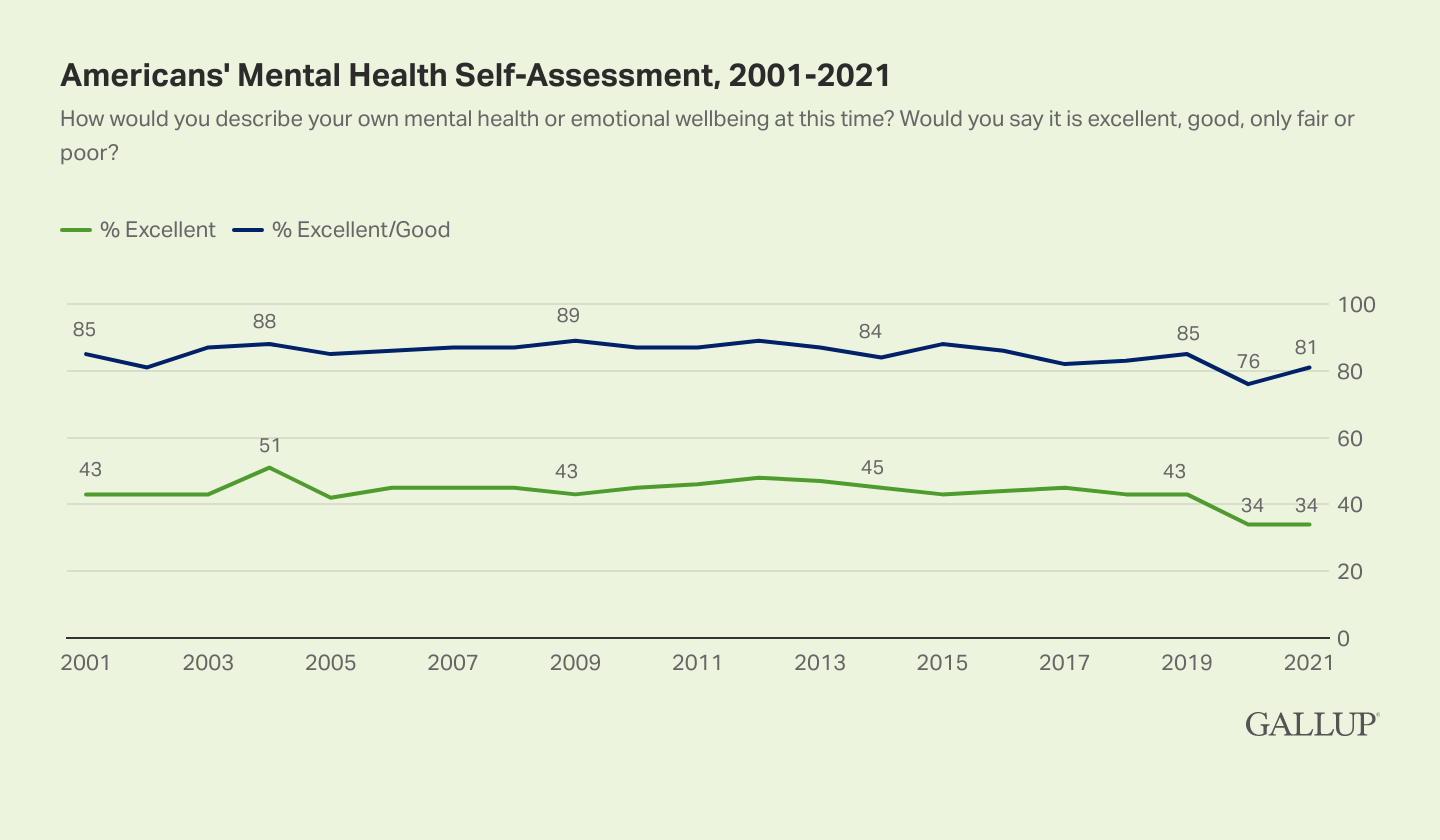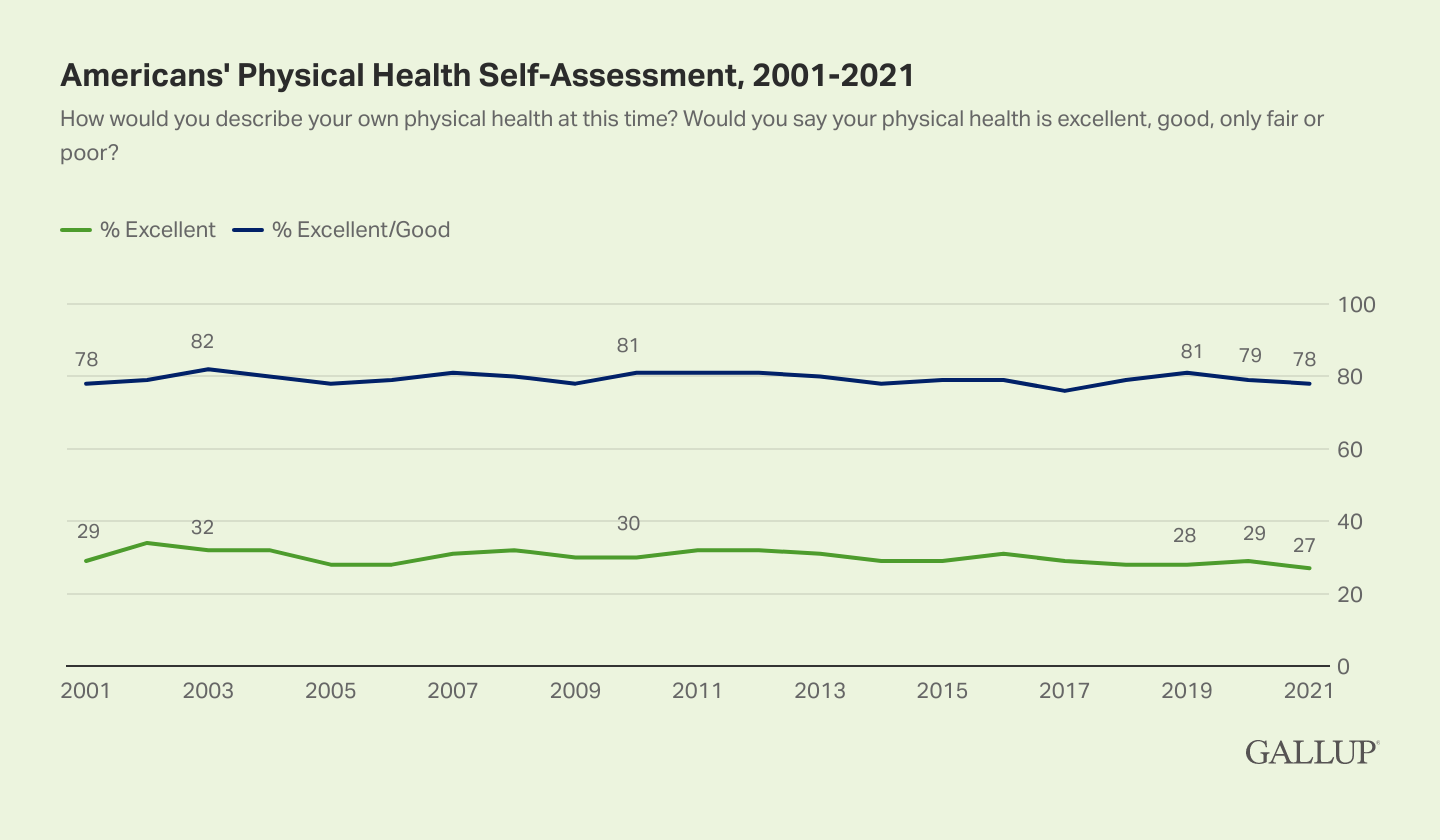Story Highlights
- A steady 34% rate their mental health as "excellent," matching record low
- Men, Republicans, churchgoers, higher-income adults rate mental health highest
- Rating of "excellent" physical health is stable but below mental health
WASHINGTON, D.C. -- Americans' "excellent" mental health rating remains at a 21-year low amid the COVID-19 pandemic, holding at 34% after dropping to that level a year ago. Before 2020, this measure of Americans' emotional wellbeing consistently reached 42% or higher, averaging 45% from 2001 to 2019.
Today, another 47% rate their mental health as "good," which is a slight improvement from 42% last year. But the combined excellent/good score of 81% is still slightly below its pre-pandemic level of 85%.

Line graph. Americans' assessment of their mental health as excellent and excellent or good since 2001. The latest data shows an unchanged 34% rating it as excellent, which is unchanged since last year when it fell nine points amid COVID-19. The current 81% who say their mental health is excellent or good is a slight uptick from 76% last year.
The latest findings, from Gallup's Nov. 1-16 poll, suggest that the public continues to grapple with the emotional effects of the pandemic 20 months after it first began in the U.S. In addition to the 81% saying their mental health is excellent or good, 15% describe theirs as "only fair" and 4% as "poor."
Americans' positive evaluations of their mental and emotional wellbeing continue to vary across demographic subgroups. The wellbeing of most groups mirrors the national trend, with their mental health scores worsening last year followed by little to no improvement this year. However, Democrats' mental health rating has been steady at a relatively low level since 2019 while frequent churchgoers' has been steadily high.
Democrats' "excellent" rating of their emotional wellbeing has consistently been the lowest among the three major party groups, ranging from 28% to 30% over the past three years. Meanwhile, 44% of U.S. adults who attend religious services weekly rate their mental health more positively than do those who attend about monthly (38%) or seldom or never (29%).
| 2019 | 2020 | 2021 | |
|---|---|---|---|
| % | % | % | |
| Gender | |||
| Men | 49 | 41 | 40 |
| Women | 37 | 27 | 29 |
| Age | |||
| 18 to 34 | 39 | 32 | 30 |
| 35 to 54 | 43 | 33 | 33 |
| 55 and older | 47 | 36 | 38 |
| Religious service attendance | |||
| Weekly | 42 | 46 | 44 |
| Nearly weekly/Monthly | 47 | 35 | 38 |
| Seldom/Never | 42 | 29 | 29 |
| Party ID | |||
| Republicans | 56 | 41 | 42 |
| Independents | 44 | 32 | 33 |
| Democrats | 30 | 29 | 28 |
| Annual household income | |||
| Less than $40,000 | 33 | 27 | 27 |
| $40,000 to $99,999 | 43 | 31 | 37 |
| $100,000 or more | 57 | 45 | 41 |
| GALLUP | |||
At least 40% of men, weekly churchgoers, Republicans and those with an annual household income of $100,000 or more rate their mental wellbeing as excellent, while their counterparts are more negative in their self-assessments.
Americans Rate Physical Health Less Positively Than Mental Health
While COVID-19 is seemingly taking a toll on Americans' mental health, there has not been any appreciable change in ratings of their physical health. Currently, 27% of U.S. adults say their physical health is excellent, and 51% say it is good. These ratings are similar to a year ago and close to the averages for the 21-year trend. Americans' current assessment of their physical health as excellent trails their mental health rating, which has been a consistent pattern since 2001.

Line graph. Americans' assessment of their physical health as excellent and excellent/good since 2001. The latest data shows a steady 27% say it is excellent, and 78% say it is excellent or good.
As has been the case in the past, young adults rate their physical health better than older adults do. Likewise, positive assessments of physical health are higher among upper-income than lower-income Americans.
| Excellent | Good | Excellent/Good | |
|---|---|---|---|
| % | % | % | |
| Age | |||
| 18 to 34 | 37 | 48 | 85 |
| 35 to 54 | 27 | 51 | 78 |
| 55 and older | 19 | 53 | 72 |
| Annual household income | |||
| Less than $40,000 | 21 | 47 | 68 |
| $40,000 to $99,999 | 25 | 54 | 79 |
| $100,000 or more | 38 | 51 | 89 |
| GALLUP | |||
Bottom Line
As the pandemic wears on, Americans' rating of their mental health, which fell to a new low last year, remains below the 21-year average for the trend. Mental health ratings among women, lower-income earners and Democrats are particularly low. Americans who attend religious services weekly are notably more emotionally resilient than those who are less religious.
The pandemic does not appear to have affected Americans' views of their physical health, which remain stable and lower than their mental health ratings.
To stay up to date with the latest Gallup News insights and updates, follow us on Twitter.
Learn more about how the Gallup Poll Social Series works.




